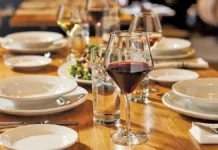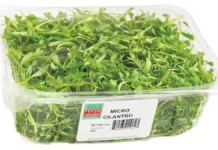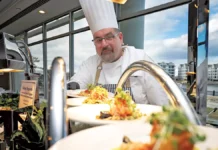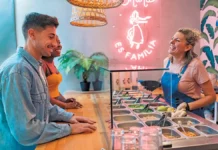
Chef/Owner, Dirt Candy NYC
+ Co-Founder, Independent Restaurant Coalition
Amanda Cohen didn’t get into the food business to make vegetarian cuisine cool, polished, or otherwise culturally assertive; it just so happens she did that anyway.
After graduating from New York’s Natural Gourmet Institute Chef’s Training Program, Amanda Cohen worked in some of the city’s most esteemed vegetarian (and veggie-forward) restaurants, including Angelica’s Kitchen, Bobby Flay’s Mesa Grill, Blanche’s Organic Café, Other Foods, Diner Bar, Teany, Pure Food and Wine, and Heirloom (which won Time Out New York’s Reader’s Choice Award for “Best Vegetarian Restaurant” under Cohen’s leadership).
After consulting for vegan restaurant Blossom and for Broadway East, Amanda Cohen decided she was ready to take the leap and open her own restaurant. Dirt Candy quickly emerged as a one-of-a-kind, a gem of a restaurant built on green philosophies that unapologetically treated vegetables as the main event. The Canada native has earned numerous plaudits for her cooking. The last year has thrust her into a very new role.
As a founding member of the Independent Restaurant Coalition (IRC), she has testified before the Small Business Committee of the House of Representatives. Amanda Cohen has emerged a leader of the IRC, which is working to get Congress to pass the $120-billion Independent Restaurant Revitalization Fund. Total Food Service wanted to have her share her vision for the 500,000 independent restaurants and 11 million restaurant workers in the U.S. that the IRC is committed to helping survive.
What got you interested in cooking and the restaurant industry?
I always loved to cook. I was sort of aimless after college and I was traveling, and I realized I needed a skill so that I could continue to travel. The only thing I wanted to do was cook. And I said, well, that’s a skill that said elite, let me be traveling and learning. And then, I went to cooking school and realized that and I started working in New York City. And it took a while, but I started realizing that it was more than just a skill to me. It was a passion.
Where did you grow up?
I am a Canadian and I grew up in Ottawa and Toronto.
What brought you to the States?
The opportunity to study at NYU and come to New York.
What about in terms of mentors, education, apprenticing. Who/ what were some of the things you did that had an impact on who you’ve become?
I didn’t really have any mentors. I went to cooking school. I went to the Natural Gourmet Institute, and that was certainly informative. I look back on it now and I’m like, wow. So much of what we were learning was way ahead of its time. And now it is widely put into practice.
What were the keys to advancing your career?
I just really worked hard, from the moment I had my first job in New York City cooking to opening my own restaurant. I did a number of different jobs, I just kept my head down and did whatever was asked.
What was the first job, and what was the job that then led you to opening your own place?
My first job was private cooking. My first restaurant job was probably at a place called, Glances. It was an organic, vegan bakery and I made a lot of sandwiches.
And then, what led you down the entrepreneurial track? Were there entrepreneurs in your family, where did you see opportunity?
I was at a job, and we mutually parted ways. I looked around and I had been at that point, probably cooking in New York City for at least 10 years. Most of the time in the vegetarian world, but I had gone back and forth between vegetarian and omnivore kitchens. But I realized that, I kind of hit a wall because it was a very different time back then and I had gone as far as I could go in the vegetarian world. I had already been an executive chef. I could have taken other executive chef positions at other kitchens, but I wasn’t going to actually be able to do my own thing. Nor was I probably going to be able to really continue to learn. So my choice was to go back into omnivore kitchens. And even take a step down, which didn’t offend me, I was fine with that or I could venture out on my own and see what I could do. And so that’s how I came to the idea of opening the first Dirt Candy. And, we opened in a very, very small space on a shoe string.
There’s been a lot of changes in our world and in this industry, since we saw you last year at the show at Javits.
Yes. The pandemic obviously had a huge effect on the restaurant industry. Probably one of the industries that was the most affected by the pandemic. And I think there was a real wake up call for most people in the industry, for various different reasons. I think we realized that that industry has some real issues and we need to fix them.

What led to your involvement in the establishment of the IRC (Independent Restaurant Coalition) to deal with those issues?
We realized that we didn’t have a voice and that’s really how the IRC came together. Within the first couple of weeks of the pandemic, chefs and restaurateurs looked around and realized, wow…
That there was nobody advocating for you in Washington?
That’s right, no one for independent restaurants. There are other groups that represent much bigger chains, but there’s nobody for the small guy, for them at all. This is a really big problem because if we’d had this beforehand, we might not be having to start from ground zero, this time around. And so, the pandemic forced us to start up the group, which is the best thing ever. Hopefully, there will never be an event like this again, but in times of need, this group will be there, to be a voice for independent restaurants.
What were the issues that were facing us before the pandemic, that came to the forefront as a result of a pandemic?
I think we’re looking at leases, rent, health insurance, and staffing. How we’re taxed, how much we’re able to charge for food, how much customers expect us to charge for food? We all talked about how we run on very thin margins, and the reality is we put so much money back into the economy. So it’s very good for the economy that we run on very thin margins, but it’s very bad for a restaurant. And it makes the industry very unstable. We’re the only industry that runs on basically two to 5% margin.
Let’s take a second and look at how the IRC came about.
It was originally just a bunch of chefs on a call, and we knew the PPP was getting talked about. Right away we knew it was not going to work for restaurants. That first round of PPP was first of all, at the beginning only had an 8-week window to use the funds. Most restaurants weren’t even open, so they didn’t have employees who could even benefit. It just didn’t make any sense. They were already starting to talk about it on the news, that this was going to be a one to two-year problem. As we talked, we realized that we needed to create a voice together. The group was able to hire a lobbyist to create a voice for us in Washington.
What were some of the priorities as you went through the process of creating this new industry voice?
We began with the basics of teaching people how to reach out to their Congress people and Senators. That gave us a voice and helped us gather numbers. We began to realize the size and scope of our constituency. Just how many restaurants and how many people we employed and how much money we inject into the economy. These numbers were staggering to us. There are 500,000 independent restaurants. We employ, 16 million workers, as a whole with 11 million of them employed by independent restaurants. That makes us the second biggest employer in the United States. That’s huge.
How did the IRC build momentum?
We had calls every day, at 7:00 a.m. and before too long you could feel the movement from needing a voice to having a voice. Daily commiserating, grew to figuring out what was happening. We shut down first in New York and then you could see the roll out of closures across the country. Everyday, you could feel a lot more people on these calls. We needed to get a more formal structure. So, Erica Polmar who had been on the call since the very beginning, was invited to become the acting executive director. She was already basically doing the job.
What does the future of the IRC look like after the Pandemic?
We’ve had those discussions for the past six months. We’ve just turned ourselves into a permanent group. We have our 501C6 status. We’re starting to get there.
Where will future funding come from?
We’re still at the beginning of it, but the idea is, it will be a membership-based organization. It’ll be for restaurateurs and chefs, to continue this voice and offer peer-to-peer conversations.
I am a bit confused. Isn’t the role of the NRA-National Restaurant Association to advocate on behalf of the independent operator?
I don’t think there should be one group, representing all restaurants, because we don’t all come in one shape and size. We’re so varied and so, there’s a place for somebody to represent much, much bigger restaurant groups. And there should be a place for somebody to represent much smaller restaurant groups. It’s hard to have the person who represents McDonald’s also represent the person who has a tiny ice cream shop in Idaho that generates a hundred thousand dollars in revenue a year. It’s very hard to have those interests represented by the same person. It’s not that there’s something wrong with the NRA. It’s just that we think that we can work alongside and accomplish a different agenda for the industry.
Why have you been so focused on the passing of the Restaurant Act from the beginning?
Our basic mission is to save restaurants. In fact, the first step was, before we even really started thinking about the Restaurant Act, was how do we fix the first round of PPP? We were a big part of the discussions of changing it from eight weeks to 24 weeks which was huge. In New York, we weren’t even going to be allowed to be open yet at all. And even if we were it was at 25%, capacity but we still had rent to pay. Most of us have tried to keep as many staff members on as possible. We still have to pay them. I still have to pay my electricity bill. This time the restaurant industry needed something extra given the extreme harm from this pandemic.
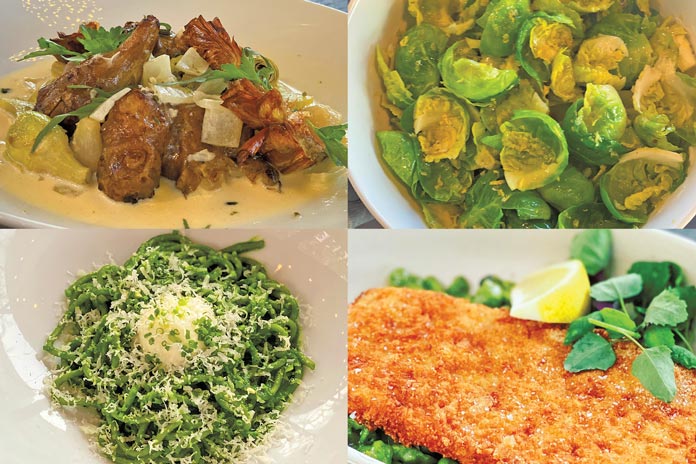
How has the Pandemic impacted your Dirt Candy restaurant?
Dirt Candy is a destination restaurant that depends on tourists. I’m not going to see tourists in this restaurant for probably another year. For me, I need the funding to be able to stay open and be here to survive the pandemic, and be able to welcome tourists back. I need something extra. For me to be able to hold onto those 35 people that I used to employ and hold on to those jobs. Because once I close, I’m not reopening, those jobs disappear forever. We need a little bit of extra for the restaurant industry.
Why can’t the 3.5x PPP that is being offered in the second round of PPP provide the solution?
It’s still going to run out, and we’re still not going to be where we need to be. Again, it’s still the way the split is. You still have to spend so much of it on your payroll. I’m not sure that still works for everybody. So the Restaurant Act was our solution. Where we felt that it’s based on the loss of revenue. We need the Restaurant Act to survive.
Did the IRC initiate the act?
We worked with our lobbyists and we worked with our co-sponsors in both houses to get the bill together. This is our baby. But I think the NRA is certainly happy with it and not against it. We just happened to come up with the initial ideas.
I get the $120 billion ask. I don’t understand how it will be dispersed.
Very simple with the idea to make restaurants whole as they were pre-pandemic. So it’s the difference between 2019 and 2020’s revenue, also accounting for any government assistance that you’ve already gotten.
So, if your restaurant generated $2 million last year and you did a million this year, then you’re looking for a million dollars minus the 110K you got in PPP?
Exactly. Yes. And then, there are stipulations with how you can use it, but it’s not limited to payroll. We are also proposing a much longer time with eight months to use it. The bill is still also being discussed, modified and reconciled between both houses. The goal is to allow restaurants to continue to operate safely for as long as possible.
Let’s assume the bill gets passed. What is needed to create customer confidence to return to your dining rooms?
Exactly. We’re seeing that right now, New York is opened up for 25%. We are struggling with that at Dirty Candy. As I walk home. I see every other restaurant and they’re not full. People don’t want to dine out yet. I think it’s going to take a long time. I also think even when we’re allowed to be at a hundred percent, and we have herd immunity there will still be people that will not be comfortable for a while.
How can people in the industry help the IRC get the Restaurant Act passed?
We still have a lot of work to do. We still could always use more support. We had a lot of support before Christmas, and we’d had over 50 bi-partisan Senators sign onto the bill. Over 200 Congress people who had also signed on. The problem is that, with the new administration and new congress we have to re-sign them on again. So that’s what we’re doing right now. There was a vote taken in the Senate during vote-a-rama, and something like 92 Senators supported the idea that restaurants needed more aid. We have a lot of support and, I think people realize how important restaurants are, not just to them personally, but to the economy on the whole. And that we are worth saving because you’re not just saving a place, you’re saving hundreds of thousands and millions of jobs.
You go to saverestaurants.com and we’ve made it as easy as possible. You follow the link, you put in your zip code and it will tell you who to email, and it will send it off right away for you. It’s pretty easy, but if you also have any personal relationship with any of your representatives, call them. Let them know how important this bill is to the survival of restaurants. The next 60 days are crucial to getting this passed.
What has the takeaway been from all of the work you have done on behalf of the IRC in Washington?
I have learned that in Congress, people are just like us. With that has come an important lesson that, in many cases, we are unnecessarily afraid of our representatives and the reality is they work for us.
With that we need to remember that there’s no shame in asking them for things that will help our industry. I’ve also realized how important that became because in many cases, Washington can be very out of touch. You simply would not believe how many times we’ve had to explain how restaurants work, and that’s why we need the Restaurant Act. Many legislators were shocked to find out how dependent so many businesses are on the restaurant ecosystem. Things as simple as how a restaurant drives a chain that so many are dependent on for their livelihoods. Many reps in Washington didn’t realize the interplay between the farmer and distributor before the product ends up on a customer’s plate in our restaurants.
With what Amazon has done to retail on Main Street across America, why are restaurants more important than ever?
We’re the fabric of the city, we’re part of the culture of the city. So, one of the reasons New York gets a lot of tourists is not just to see Broadway, or the Empire State Building, they also come for all the different kinds of foods they can eat. One of the reasons that our neighborhoods are really vibrant, neighborhoods anywhere in the country, is because of the restaurants.
It has been a big year for Takeout & Delivery. Thoughts?
It’s a tough question. For me, my restaurant is not set up to do takeout and delivery service. It’s just not physically built that way. I have a big open kitchen and our pass is where our bar is. And so, there’s nowhere to politely do pickup and delivery. But I think that, somewhat modern restaurants will probably continue to do it. And I think we’ve all learned that we can pivot them and we can be a little bit more flexible in what we thought our restaurants can do.
How have you changed your menu over the past year?
Well, I used to be a nine course, pretty fine dining restaurant. I can’t do that now at all. So, we do a three to four course menu, and we also do sandwiches and salads. We are a lot more casual and I don’t think we could do our nine course meal out on Allen Street. It’s hard when there’s a truck right next to you.
We are about to elect a new mayor in NYC. What are your thoughts on the characteristics of the ideal candidate?
Somebody I think who is a little bit more in touch with small business in the city. I think there’s a lot of regulations that have been around for years. That were probably at one point really important, but are no longer valid. And they’re still in place because nobody has taken the time or the step to change them. There’s some pretty archaic laws on the books here, that we need to change. Tip sharing needs to be consistent with the State laws. I would also like to see some long-term structure given to outdoor dining.
Crystal ball, what do you see in your future?
Yes, I would really like to believe in the roaring twenties, in the golden age lying ahead. For right now, my head is still surviving this. It’s all about surviving.
Images courtesy of Amanda Cohen, Dirt Candy, and IRC
To learn more about Amanda Cohen and Dirt Candy, visit their website.
To learn more about the Independent Restaurant Coalition, visit their website.




















